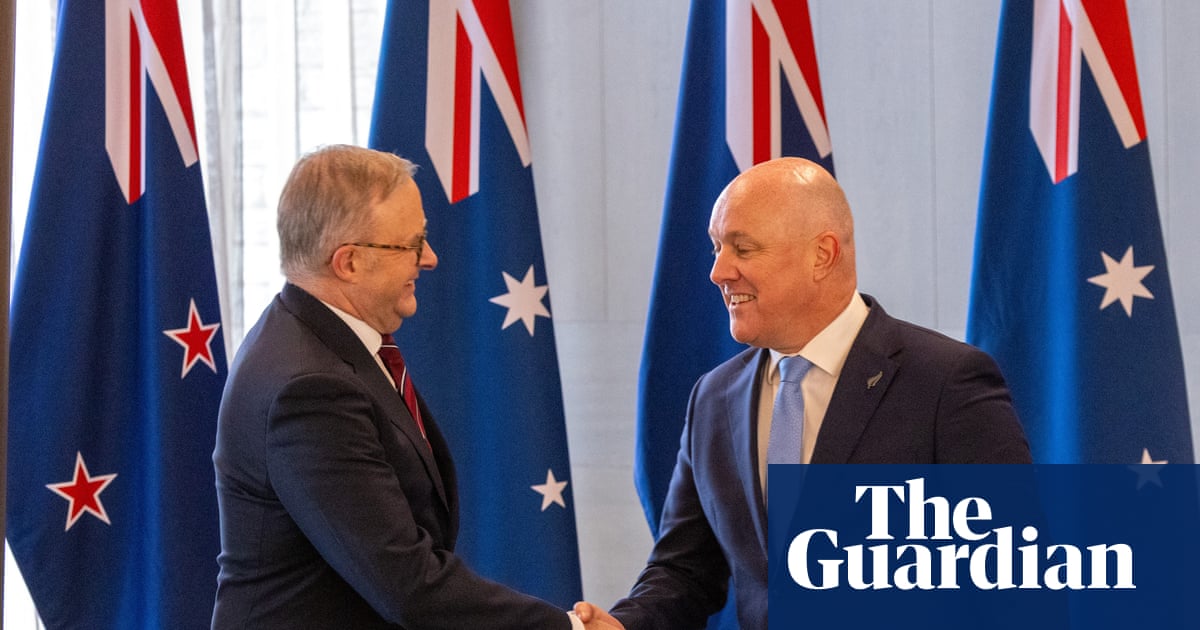Australia’s prime minister, Anthony Albanese, and his New Zealand counterpart, Christopher Luxon, have urged Israel to reconsider its plans to take over Gaza City and reaffirmed their intentions to deepen security ties, as they met in Queenstown on Saturday.
Following a pōwhiri (formal Māori welcome) at Te Wharehuanui – a private retreat built by the billionaire Xero founder, Rod Drury – Luxon said the world had become uncertain and fractious, and that New Zealand “has no greater friend than Australia”.
“The two of us being able to come together to advocate for our values and stand up in the world and go out into the world together is really important,” he said.
Sign up: AU Breaking News email
Albanese thanked Luxon and the local iwi (tribe) Ngāi Tahu for the “warm, generous” welcome and similarly pointed to the importance of the trans-Tasman alliance and being part of the “Pacific family” amid global upheaval.
“There is one thing that is certain … Australia and New Zealand stand together.”
The welcome concluded with a boisterous hug between the two leaders. It is the pair’s second annual meeting, following Luxon’s visit to Canberra last year.
Gaza and the topic of recognising Palestinian statehood loomed large, two days after the Israeli security cabinet approved a plan to take over Gaza City, prompting global condemnation.
On Saturday, the foreign ministers of both countries alongside Germany, Italy and UK released a joint statement condemning Israel’s latest offensive. Last month, New Zealand and Australia cosigned the New York Call – a declaration indicating the possible recognition of Palestinian statehood.
Speaking to media after their formal meeting, neither Luxon nor Albanese would confirm when a declaration of statehood might happen but said Israel’s latest plans were “wrong”.
“Military action, as we’ve seen, is not the way to solve this problem,” Luxon said. “The latest action from Israel we’re seeing in the past 24 hours is wrong and risks violating international law.”
Australians want to see a ceasefire, Albanese said. “They want to see the killing stop. They want to see hostages released. They want to see peace in the region.”
Both leaders rejected the idea that possible trade retaliation from the US president, Donald Trump, over recognising Palestinian statehood would affect their positions. Australian goods imported into the US have attracted Trump’s baseline 10% tariff, while last week, New Zealand was hit with a surprise 15% tariff.
“We make our own assessments in … our own economic and our security interests,” Luxon said.
“Australia has exactly the same position,” Albanese said. “As a sovereign nation, we make our decisions.”
The leaders also discussed deepening ties in defence and security, and fielded questions about their nations’ relationships with China, which is the largest trading partner to both countries but whose growing influence and military exercises in the Pacific have caused discomfort.
skip past newsletter promotion
Sign up to Breaking News Australia
Get the most important news as it breaks
Privacy Notice: Newsletters may contain info about charities, online ads, and content funded by outside parties. For more information see our Privacy Policy. We use Google reCaptcha to protect our website and the Google Privacy Policy and Terms of Service apply.
after newsletter promotion
The leaders told the media they had each made successful visits to China recently.
“We cooperate where we can and disagree where we must,” Albanese said.
Trade and economic growth was high on the agenda, with each committing to coordinate closely on economic reform.
But while the leaders stressed their strong friendship, the countries are not without tensions, the thorniest of which arose in Saturday’s talks.
The deportations of New Zealanders – despite in some cases tenuous connections to New Zealand – has provoked long-running frustration in the relationship. After Albanese delivered an olive branch to New Zealand in 2023, announcing that the immigration department would have to pay greater attention to the strength, duration and nature of a person’s connection to the Australian community, that was suddenly wound back in mid 2024.
Responding to questions over whether Australia’s U-turn was fair to New Zealand, Albanese said he had to do what was best for Australia, but he expected Luxon would bring up the issue.
“Our priority is safety in Australia but also a commonsense approach,” Albanese said.
